Link to 2020 court hearings Part 1
Link to 2/16/21 online complaint receipt to the Nevada Bar vs. Brittany Wood
Link to Complaint OBC21-0187 vs. Brittany Wood
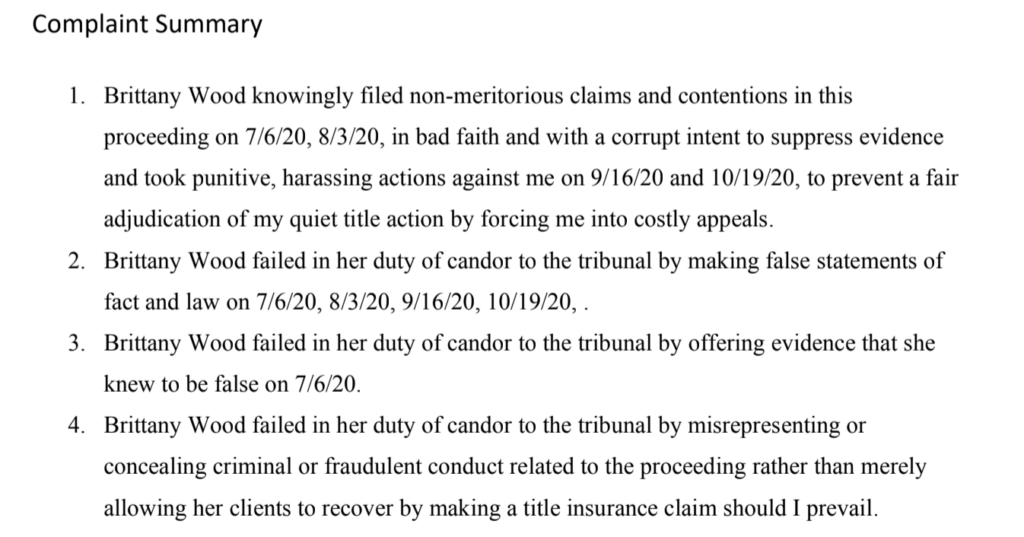
Office of Bar Counsel stated this complaint must be handled by a judge

Link to 3/4/21 rejection letter
Implicated Nevada Rules of Professional Conduct

NRPC 3.1
Rule 3.1. Meritorious Claims and Contentions. A lawyer shall not bring or defend a proceeding, or assert or controvert an issue therein, unless there is a basis in law and fact for doing so that is not frivolous, which includes a good faith argument for an extension, modification or reversal of existing law.
Brittany Wood filed these unwarranted, meritless motions, joinders, and requests into A-19-799890-C to unfairly get Nona Tobin’s claims dismissed with prejudice for no proper purpose as to her clients had a simple remedy of making a title insurance claim.
7/6/20 JMOT Quicken Chiesi
7/6/20 RFJN Quicken Chiesi
7/6/20 RFJN pages 1-4 is the exhibit list of documents in the Chiesi/Quicken request for judicial notice
8/3/20 RPLY Chiesi Quicken
Chiesi/Quicken wrongly prevailed by 12/3/20 NODP notice of dismissal with prejudice that expunged three lis pendens to cover up that her clients were not bona fide purchasers nor innocent third parties
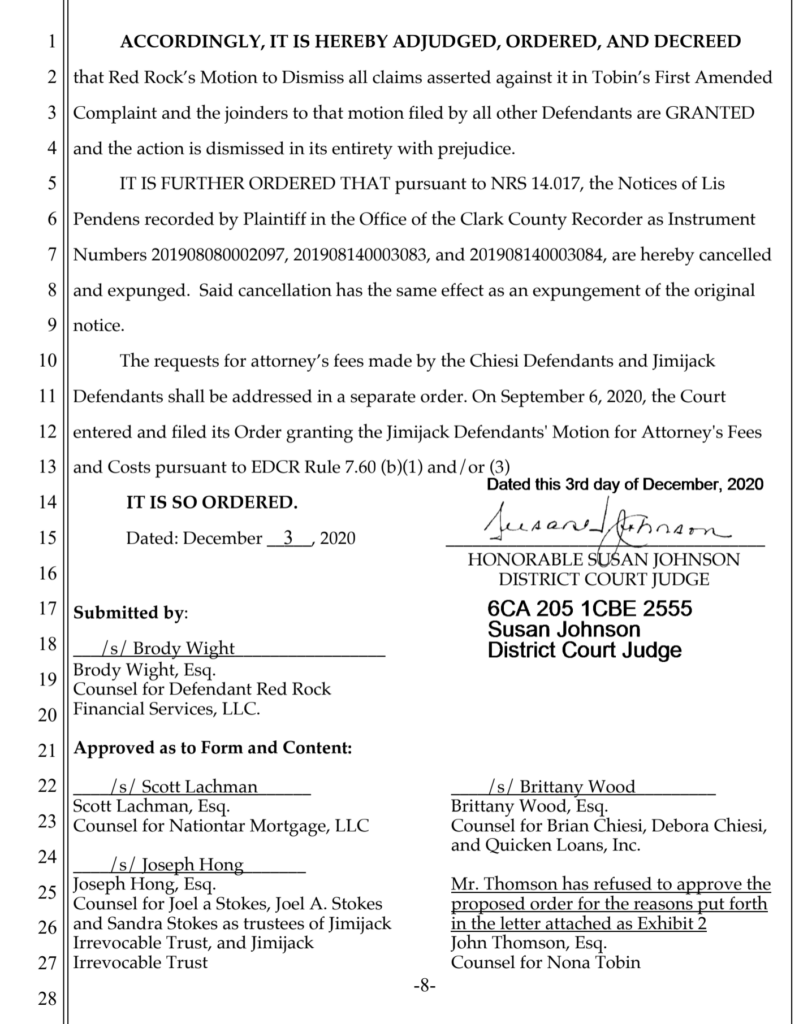
Link to NRS 111.180
NRS 111.180 Bona fide purchaser: Conveyance not deemed fraudulent in favor of bona fide purchaser unless subsequent purchaser had actual knowledge, constructive notice or reasonable cause to know of fraud.
1. Any purchaser who purchases an estate or interest in any real property in good faith and for valuable consideration and who does not have actual knowledge, constructive notice of, or reasonable cause to know that there exists a defect in, or adverse rights, title or interest to, the real property is a bona fide purchaser.
2. No conveyance of an estate or interest in real property, or charge upon real property, shall be deemed fraudulent in favor of a bona fide purchaser unless it appears that the subsequent purchaser in such conveyance, or person to be benefited by such charge, had actual knowledge, constructive notice or reasonable cause to know of the fraud intended.
Link to NRS 14.017
NRS 14.017 Notice of pendency of actions affecting real property: Transferability of property after withdrawal or cancellation.
1. Upon the withdrawal of a notice of the pendency of an action affecting real property, or upon the recordation of a certified copy of a court order for the cancellation of a notice of the pendency of such an action with the recorder of the county in which the notice was recorded, each person who thereafter acquires an interest in the property as a purchaser, transferee, mortgagee or other encumbrancer for a valuable consideration, except a party to the action who is not designated by a fictitious name at the time of the withdrawal or order of cancellation, shall be deemed to be without knowledge of the action or of any matter, claim or allegation contained therein, irrespective of whether the person has or at any time had actual knowledge of the action or of any matter, claim or allegation contained therein.
2. The purpose of this section is to provide for the absolute and complete transferability of real property after the withdrawal or cancellation of a notice of the pendency of an action affecting the property.
(Added to NRS by 1987, 637)
NRS 14.017
Brittany Wood knows that no claims in prior proceedings were fairly adjudicated
NSM and Jimijack prevailed without adjudication
Nationstar claims and dispositions (260 pages of filed documents – 1/11/16 COMP, 6/2/16 AACC, 3/25/19 RCCM, 2/20/19 NTSO, 3/12/19 ANEO, and 5/31/19 SODW)
Nationstar prevailed without proof (29 pages links/screenshots)
Nationstar’s evidence was never examined (7 pages linked analysis of 3/12/19 4th supplemental list of disclosures)
Brittany Wood would also have seen, if she had looked, that nobody’s claims were adjudicated fairly in the prior proceedings, i.e., Nationstar never put on a case, never went to trial and prevailed despite dismissing all its claims without adjudication.
Jimijack claims dispositions (21 pages filed documents )
Tobin claims dispositions TOC (9 pages links/screenshots)
Tobin vs. Jimijack (59 pages filed documents 2/1/17 AACC, 3/13/17 RCCM, 6/24/19 NEFF)
Tobin vs. Lee (45 pages filed documents 2/1/17 CRCM, 3/13/17 XCAN, 6/24/19 NEFF)
Ex parte meeting with Judge Kishner resulted in Nona Tobin’s dispositive motions not being heard
STRICKEN SUA SPONTE BY BENCH ORDERS AT 4/23/19 EX PARTE HEARING
- 4/9/19 Tobin/Hansen Trust Notice of completion of mediation
- 4/9/19Tobin Notice of appearance to return to Pro Se status
- 4/10/19 Tobin Opposition to Nationstar’s motion for summary judgment against Jimijack and countermotion for summary judgment
- 4/12/19 19 Tobin notice of appearance to return to Pro Se status as an individual (duplicate filed in error)
- 4/12/19 Tobin/Hansen Trust Notice of completion of mediation (duplicate filed in error)
- 4/12/19 Tobin OPPC vs Nationstar and Jimijack (duplicate filed in error)
- 4/17/19 Tobin reply to support joinder to Nationstar motion for summary judgment
4/23/19 bench orders were not formalized until 11/22/19 order was entered five months after the trial I was excluded from:
Because she is not a party to the case, all documents filed with this Court by Nona Tobin as an individual, are rogue documents and are stricken from the record. This includes both the Motion to Dismiss and Motion for New Trial (and all oppositions or replies) and the Notice of Lis Pendens.
Page 4, paragraph 3, 11/22/19 post-trial order that formalized Judge Kishner’s 4/23/19 ex parte bench orders to strike Nona Tobin’s pro se filings from the record
Judge Kishner also refused to hear or consider Nona Tobin’s post-trial Pro Se motions that were stricken by granting improper motions by Joseph Hong (8/7/19 RESP/MSTR/MAFC) for counter- defendants and David Ochoa for cross- defendant HOA (8/8/19 RESP/JMOT) at the 9/3/19 hearing
- 7/22/19 MNTR motion for a new trial per NRCP 54(b) and NRCP 59(a)(1)(A)(B)(C)(F)
- 7/29/19 MTD Tobin Pro Se motion to dismiss Judge Kishner’s order granting quiet title to Jimijack for lack of jurisdiction per NRS 38.310(2)
- 8/7/19 NOLP 39-page Notice of Lis Pendens of case not in Judge Kishner’s court expunged from the property record by Judge Kishner granting the motion to strike by the HOA that had no adverse claim to Tobin for the title
- 8/26/19 FFCO Tobin Pro Se proposed findings of fact and order to grant Tobin motion to dismiss for lack of jurisdiction
- 8/8/19 LISP 7-page recorded Lis Pendens was expunged by 11/22/19 order although to do so was outside of Judge Kishner’s jurisdiction
Brittany Wood knows that her co-conspirators prevailed by deceit
Brittany Wood knows that the Nationstar-Jimijack settlement was fraudulent
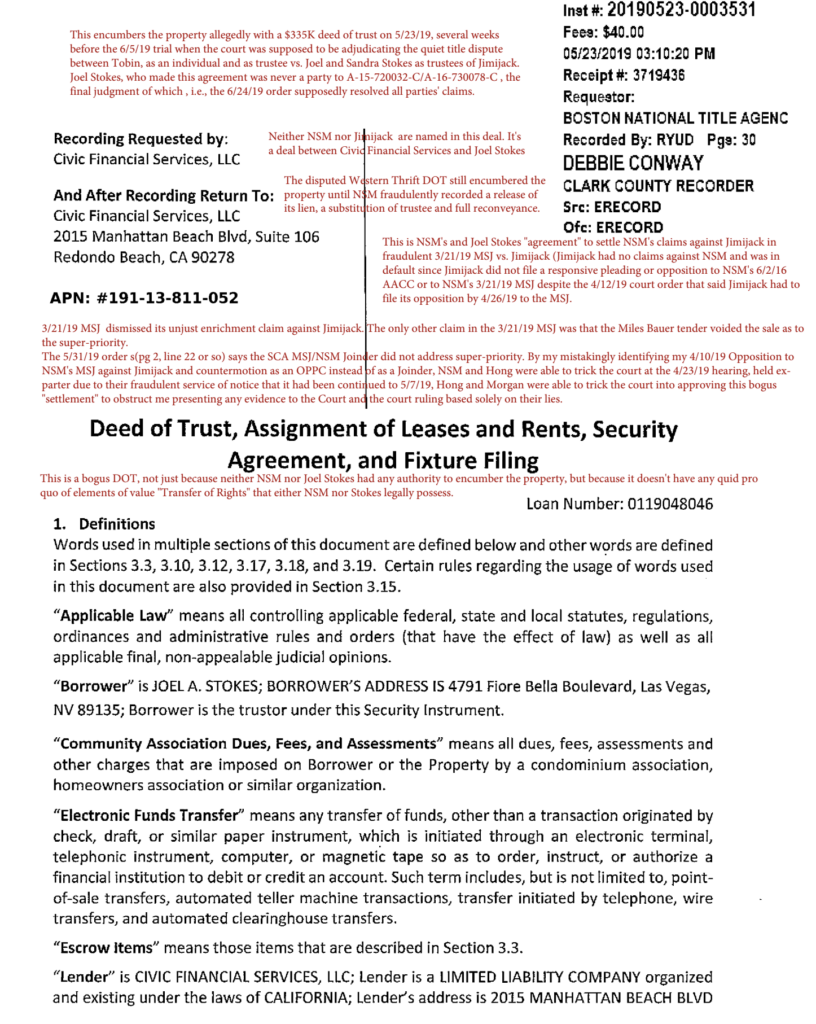
Rule 3.4 Fairness to opposing party
Rule 3.4. Fairness to Opposing Party and Counsel. A lawyer shall not: (a) Unlawfully obstruct another party’s access to evidence or unlawfully alter, destroy or conceal a document or other material having potential evidentiary value.
Brittany Wood did not explain how her clients would have been prejudiced if Nona Tobin’s claims had been heard on their merits, and yet she took aggressive actions, including gross misrepresentations of the property record, the court record, and the law and ensure that ALL Nona Tobin’s claims, even those to which her clients held no interest, were dismissed with prejudice and ALL her evidence suppressed.
Brittany Wood suppressed the preliminary title report and proof of title insurance
Link to 2/7/20 emails of Nona Tobin’s frustrated attempts to get the preliminary title report.
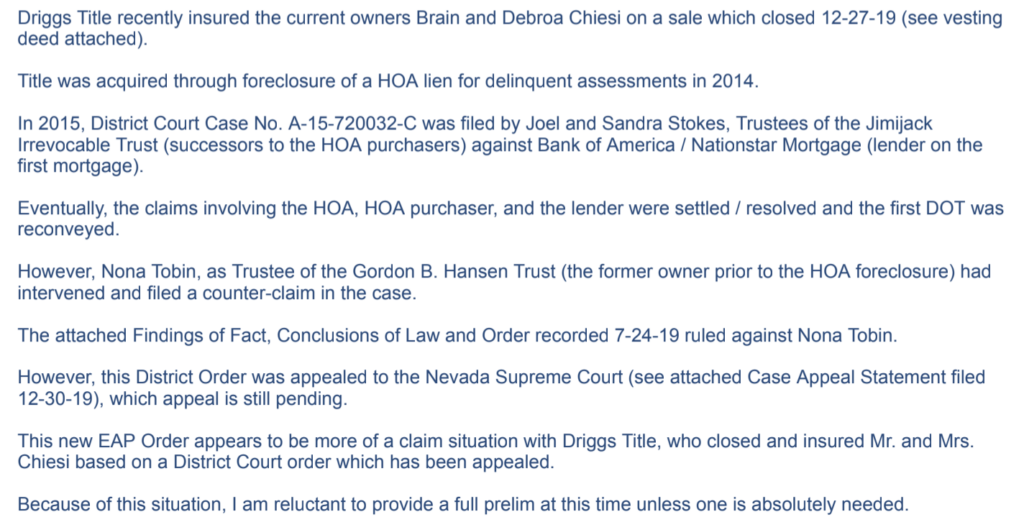
Wood misrepresented the property record to obscure her clients’ wrongdoing at Nona Tobin’s expense
Link to RFJN Clark County official property record for APN: 191-13-811-052
Wood concealed all property records related to the fraudulent actions dispute between Nona Tobin accused Nationstar and Joel Stokes
She deliberately excluded from the 7/6/20 Request for Judicial Notice ALL of the assignments related to the Hansen deed of trust that are germane to Tobin’s case against Nationstar and Joel Stokes.
4/22/04 Hansen deed of trust assignments are all disputed and none were included in Wood’s request for judicial notice
4/12/12 ASSIGN MERS to BANA by BANA
9/9/14 ASSIGN BANA to Wells Fargo by BANA
12/1/14 ASSIGN BANA to Nationstar by Nationstar
3/8/19 RESCIND 12/1/14 BANA to Nationstar by Nationstar
3/8/19 ASSIGN Wells Fargo to Nationstar by Nationstar
6/3/19 RECONVEY Hansen DOT to Joel Stokes – not to Nona Tobin, the personal representative of the borrower’s estate – by Nationstar
Brittany Wood knew that Jimijack’s deed was void
6/9/15 DEED Jimijack defective VOID deed was in Wood’s Exhibit 7 even though Brittany Wood knew that Jimijack’s deed had no legal capacity to hold or transfer title was inadmissible per NRS 111.345 and that all subsequent transfers were also void
Link to 1/17/17 Tobin DECL declaration re Jimijack’s defective deed

Brittany Wood knew that Jimijack’s 5/1/19 transfer of title was void as Jimijack had no valid interest to convey
5/1/19 DEED fraudulent conveyance of title from Jimijack to Joel Stokes five weeks bfore the trial to evade detection by Judge Kishner that both the Hansen Trust’s 8/27/08 deed or Nona Tobin’s 3/28/17 deed were superior to Jimijack’s deed for which no notary record exists.
Jimijack to Joel Stokes deed was recorded five weeks before the trial and without Judge Kishner ever admitting it into evidence despite NRS 111.345, but it is in Wood’s Exhibit 15.

Brittany Wood knowingly misrepresented Nona Tobin’s deed as”a wild deed outside the chain of title.”

Wood deliberately damage Nona Tobin, and obstructed her case from being heard, by misrepresent the 3/28/17 recorded deed, as an individual, to falsely represent to the court that this deed was inadequate to give Nona Tobin standing to pursue an NRS 40.010 claim.
Why then falsely claim that I had recorded a wild deed? (7/6/20 JMOT, page 6)
Nona’s authority to close the Gordon B. Hansen Trust and execute a deed to transfer its sole asset to the sole remaining beneficiary has been uncontradicted in the Clark County official property record since 2017.
Brittany Wood advocated vigorously for the preposterous argument that Nona was in privity with herself as trustee of a trust that was closed in 2017 as if there was only one element to claims preclusion and not four.
Brittany Wood assiduously ignored Jimijack’s obviously defective deed because she knew that the Chiesi deed is the fruit of the poison Jimijack deed tree.
Brittany Wood condoned the covert transfer of Jimijack’s defective deed to non-party Joel A. Stokes before the trial solely because she knew that Jimijack’s deed was void and that all subsequent transfers were void.
Jimijack’s 6/9/15 deed is void. Joel Stokes’ 5/1/19 deed is void. Wood’s clients’ 12/27/19 deed is also void
12/27/19 DEED Joel A. Stokes to Brian and Debora Chiesi
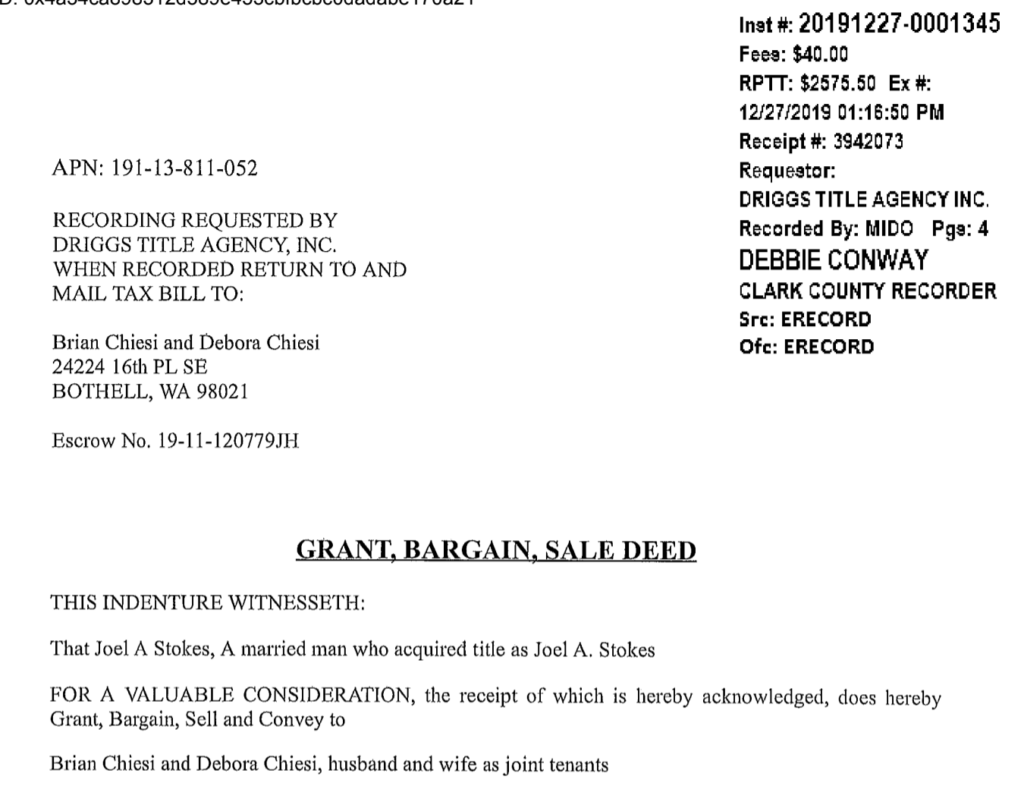
Implicated Statutes Fraudulent Conveyances
NRS 205.330 Fraudulent conveyances. Every person who shall be a party to any fraudulent conveyance of any lands, tenements or hereditaments, goods or chattels, or any right or interest issuing out of the same, or to any bond, suit, judgment or execution, contract or conveyance, had, made or contrived with intent to deceive and defraud others, or to defeat, hinder or delay creditors or others of their just debts, damages or demands; or who, being a party as aforesaid, at any time shall wittingly and willingly put in use, avow, maintain, justify or defend the same, or any of them, as true and done, had, or made in good faith, or upon good consideration, or shall alien, assign or sell any of the lands, tenements, hereditaments, goods, chattels or other things before mentioned, conveyed to him or her as aforesaid, or any part thereof, is guilty of a gross misdemeanor.
NRS 205.360 Knowingly receiving fraudulent conveyance. Every person who shall receive any property or conveyance thereof from another, knowing that the same is transferred or delivered in violation of, or with the intent to violate, any provision of NRS 205.345, 205.350 and 205.355, shall be guilty of a misdemeanor.
NRS 111.175 Conveyances made to defraud prior or subsequent purchasers are void. Every conveyance of any estate, or interest in lands, or the rents and profits of lands, and every charge upon lands, or upon the rents and profits thereof, made and created with the intent to defraud prior or subsequent purchasers for a valuable consideration of the same lands, rents or profits, as against such purchasers, shall be void.
Berge v. Fredericks, 95 Nev. 183, 186 (Nev. 1979) (“However, a party claiming title to the land by a subsequent conveyance must show that the purchase was made in good faith, for a valuable consideration; and that the conveyance of the legal title was received before notice of any equities of the prior grantee.”)
“In cases of this kind it is seldom, if ever, possible to prove fraudulent intent by direct evidence, hence it is necessary to resort to circumstantial evidence. Badges of fraud are infinite in number and form. 27 C.J. 483, 822.” S.G. R. Bank v. Milisich, 48 Nev. 373, 376-77 (Nev. 1925)
Badges of fraud
Link to Stay Clear of Fraudulent Transfer Badges
Excerpt from Dec 17, 2018 Post by AssetProtectionAttorneys
A transfer is considered fraudulent if made with actual intent to hinder, delay, or defraud any creditor of the debtor. There’s no bright-line rule here. A judge looks for indicia or “badges” of fraudulent intent. A judge has broad discretion in determining whether the presence of one or more badges indicates a transfer was fraudulent.
Webinar Rebroadcast: Avoiding the Badges of Fraudulent Transfers
Furthermore, the standard of proof that must be met to indicate fraudulent intent is not the “beyond a shadow of a reasonable doubt” standard of criminal trials. But rather it is the less rigorous “preponderance of evidence” standard of civil litigation. The potential badges you should avoid include:
1. The transfer or obligation to an insider:
This may, or may not, be a factor in determining whether there was a fraudulent transfer. For example, it’s common business practice for someone to transfer personal property to a business they control (such as an LLC, LP, or a closely held corporation) in order to capitalize it. Such a transfer, if done while creditor seas are calm, will almost certainly not be considered fraudulent, especially if the transferor receives an interest in the company equivalent to their capital contribution. On the other hand, transferring real estate to one’s uncle the week before a lawsuit commences will likely be considered fraudulent.
2. The debtor retained possession or control of the property transferred after the transfer:
This may or may not be a factor in a fraudulent transfer case. For example, although a lien is a transfer of equity, mortgaged real estate typically remains in the owner’s possession as a matter of standard business practice. In contrast, placing one’s home in an international trust and then continuing to live in it rent-free is more likely to be seen as a fraudulent transfer.
3. The transfer or obligation was concealed:
See the comment for badge of fraud (7) below.
4. Before the transfer was made or obligation was incurred, the debtor had been sued or threatened with suit:
Some transfers (such as a gift to an insider) are very vulnerable to a fraudulent transfer ruling if they occur after a creditor threat arises. At the same time, no judge would expect you to stop your normal business activities once you’ve been sued, especially considering that a lawsuit may drag out for years. Of course, some business activities may involve transfers of assets.
Consequently, if you are facing a lawsuit, it’s important to transfer property so there is a plausible reason for the transfer, besides trying to protect assets. For example, by taking money and investing it in an LLC, you can protect the money while honestly claiming that you were only engaging in a business venture, instead of trying to defeat a creditor. At the same time, your claim of having a valid business purpose may be insufficient if other badges point to the fact that you transferred the asset to hinder, delay, or defraud your creditors.
7. The debtor removed or concealed assets:
Oftentimes, there’s a good reason for financial privacy, besides trying to defeat a creditor. Depending on your reasons, it may not be safe to conceal assets while the creditor seas are calm. However, this is usually not a good idea once one is threatened by creditors. Remember: everything can and will usually be revealed in court, and privacy is more for lawsuit prevention than anything else. Above all, remember that no plan should rely exclusively on secrecy and that improper (but not all) financial privacy measures are usually considered a badge of fraud.
Above all, remember a judge must determine whether a particular transfer was undertaken to cheat a creditor. If there’s not a plausible economic reason for a transfer, and if the transfer is not a part of “business as usual”, then it might not stand up if challenged in court. Such transfers will almost always carry at least one badge of fraud.
Brittany Wood ignored all the lis pendens
She did not include any of the lis pendens in the RFJN that show both that her clients recorded claims adverse to mine while lis pendens were on record, but also the Joel and Sandra Stokes released a lis pendens that wasn’t theirs.
Lis Pendens exhibit (76 pages) shows all the recorded and released lis pendens that Brittany Wood failed to acknowledge when she got Judge Johnson to expunge Tobin’s lis pendens as if they had never existed.
The only purpose for this order was to cover-up criminal actions, and Brittany Wood knows it.
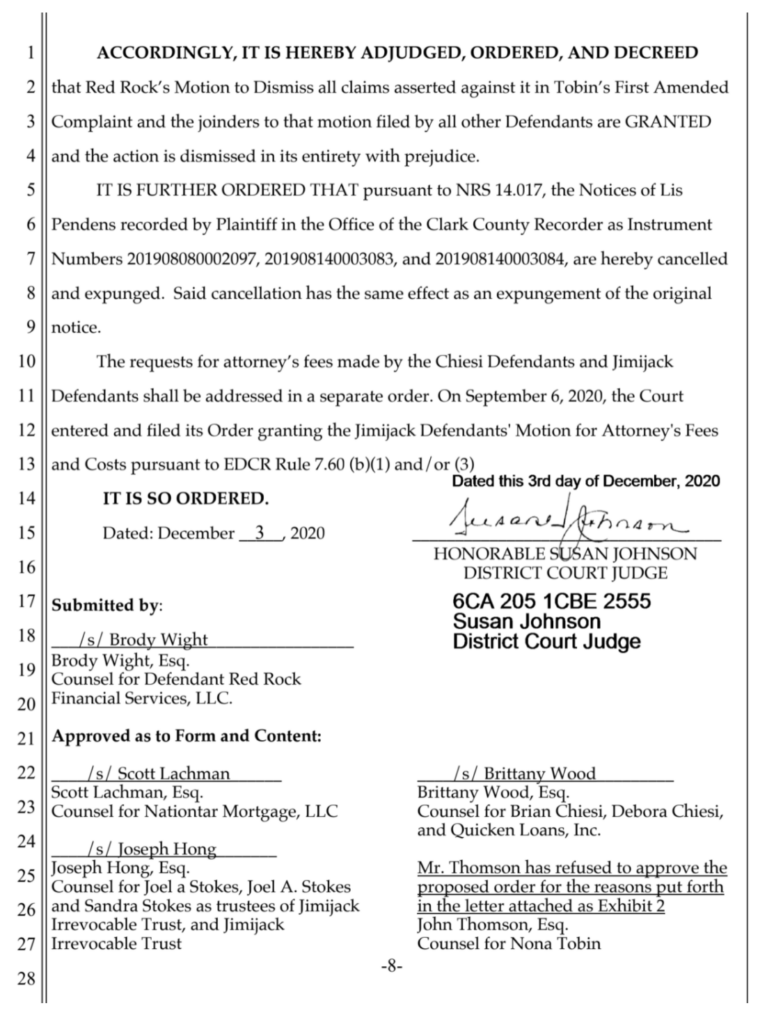
More implicated professional ethics standards
TRANSACTIONS WITH PERSONS OTHER THAN CLIENTS
Rule 4.1. Truthfulness in Statements to Others. In the course of representing a client a lawyer shall not knowingly:
(a) Make a false statement of material fact or law to a third person; or
(b) Fail to disclose a material fact to a third person when disclosure is necessary to avoid assisting a criminal or fraudulent act by a client, unless disclosure is prohibited by Rule 1.6.
Rule 4.4. Respect for Rights of Third Persons.
(a) In representing a client, a lawyer shall not use means that have no substantial purpose other than to embarrass, delay, or burden a third person, or use methods of obtaining evidence that violate the legal rights of such a person.
MAINTAINING THE INTEGRITY OF THE PROFESSION
Rule 8.3. Reporting Professional Misconduct.
(a) A lawyer who knows that another lawyer has committed a violation of the Rules of Professional Conduct that raises a substantial question as to that lawyer’s honesty, trustworthiness or fitness as a lawyer in other respects, shall inform the appropriate professional authority.
Rule 8.4. Misconduct. It is professional misconduct for a lawyer to:
(a) Violate or attempt to violate the Rules of Professional Conduct, knowingly assist or induce another to do so, or do so through the acts of another;
(b) Commit a criminal act that reflects adversely on the lawyer’s honesty, trustworthiness or fitness as a lawyer in other respects;
(c) Engage in conduct involving dishonesty, fraud, deceit or misrepresentation;
(d) Engage in conduct that is prejudicial to the administration of justice;
(f) Knowingly assist a judge or judicial officer in conduct that is a violation of applicable rules of judicial conduct or other law.